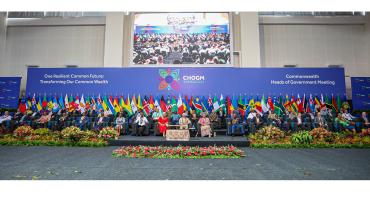For Kimani, life is full of challenges and every day it’s about overcoming them without a focus on the fact that he has a disability.

However, Kimani is adamant that his disability is no barrier to success. In fact, he finds the term ‘disabled’ to be degrading and demeaning, when it is used to describe him. So what if Kimani has problems with his lower limbs? It hasn’t stopped him from becoming an IT expert or qualified in business management. Nor has it stopped him from enjoying his hobby and passion: collecting and making radio transmitting devices.
For Kimani, life is full of challenges and every day it’s about overcoming them without a focus on the fact that he has a disability. That’s why he can’t understand why prospective employers fail to see beyond his metal crutches. Kimani has the talent, the skills and the determination but not someone who’ll take a chance to recognise his abilities. Instead they cite his disability as a barrier to employment.
That’s why the Rights and Freedoms Bill is so important to Kimani, and others like him.
Kimani believes that the Bill is a real step forward in addressing discrimination. But Kimani believes more needs to be done, especially since Grenada is party to the UN Convention on the Rights of Persons with Disabilities.
The Grenada Bar Association, in collaboration with the Grenada National Organisation of Women and the Constitution Reform Advisory Committee (CRAC), has been holding public meetings to explain the seven Bills on which Grenadians go to the polls in the country’s referendum this week.
So how might this Bill help people with a disability like Kimani?
Under the chapter entitled ‘Directive Principles of State Policy’, the government says it will aspire, and has created a duty for itself, to ensure equal opportunities for anyone with a disability. This commitment also flows from Grenada’s global commitments, including the Convention on the Rights of Persons with Disabilities (CRPD), which the government ratified in 2014.
To ensure true equality, Grenada would have to introduce new domestic laws and align them to the commitments undertaken by it as a state party to the CRPD.
Why is this important?
According to the 2011 Grenada Population and Housing Census, almost 14 per cent of the population has a disability It means that under this category, Grenadians with a disability were at greater risk than the general population of experiencing restrictions in performing tasks or participating in society.
The Universal Periodic Review mechanism peer reviews human rights situations of UN member states. Grenada was reviewed for the second time in January 2015. It accepted the following recommendations in regard to disability rights protection and promotion. Grenada will continue:
- to take steps to ensure that legislation and policies are in line with the CRPD
- paying the necessary attention to improve the enjoyment of human rights by people with disabilities
But legislation is not enough in dealing with disability discrimination. There needs to be a shift in attitude. The country is moving progressively forward in addressing discrimination based on disability. But it may also have to raise awareness and try to change attitudes when employers are confronted with applicants who have a disability. Campaigners say that underestimating the potential and capabilities of people with disabilities is often a hindrance to full inclusion, equality and non-discrimination.
The ideal situation is one in which Kimani would be gainfully employed without any discrimination, realising his full potential as a young, energetic, educated and professionally qualified man who refuses to believe that he is ‘disabled’. After all, Kimani is only ‘differently abled’ and so able to contribute positively to Grenadian society.



